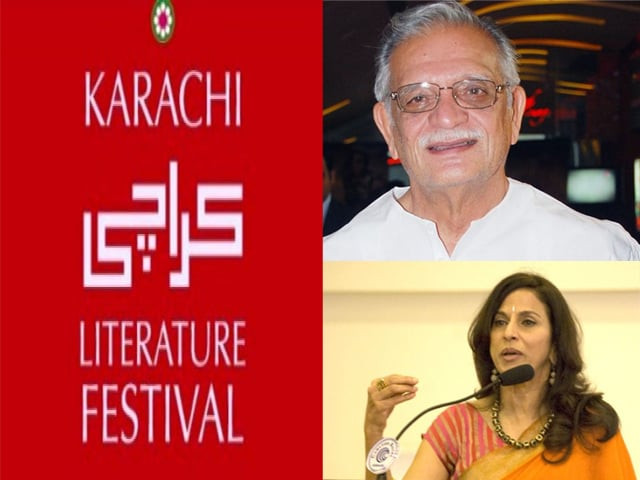Yet art travels; it is not the prisoner of a boundary, it defies all limitations and connects people divided by politics and religion.
Indian movies and serials might be produced and directed by Indians but they are appreciated by people of different nationalities. They are as popular within the national boundaries as they are across the border. Coke Studio Pakistan is not the property of the Islamic republic- other nationals too have claim on it.
Alif Laila sung by Asif Lohar, Meesha Safi and the team mesmerises the audience in India with the same intensity as it does in Pakistan. Zeb and Haniya’s song “Bibi Sanam” enchants all regardless of boundaries.
They act as a binding factor, as a bridge between political nationalities.
The very fact that Afzal Gulzar and Shobha De get an invitation to attend a Literature festival in Pakistan shows that despite the shrill and chill in the relationship between the two South Asian nations people are willing to cross the boundaries of political paranoia.
The very fact that Pakistani authors get huge attention at the Jaipur Literature Festival demonstrates the urge among people to connect. It shows that political differences never obscure the urge to appreciate the works of art.
In that sense, an author is not a citizen of a nation serving the narrow political interest of the establishment. They are representatives of humanity whose acceptability is untainted by petty political considerations.
The disappointment, therefore, of the Pakistani citizen is understandable when Gulzar, the director Vishal Bharadwaj and Shobha De terminated their promised engagement at the Karachi Literature Festival (KLF) abruptly.
The explanation given by Gulzar, two days after he returned to India, was that after his visits to his birthplace Deena and to poet Ahmed Nadim Qasmi’s gravesite he felt “uneasy in the chest”. He is 83 and such uneasiness is natural at this age, but a sane mind is also willing to buy the conspiracy theory that he postponed his trip due to security considerations.
Pakistan, I believe would have felt more than happy to take care of his uneasiness. A common Indian gets unsolicited warmth in the streets of Pakistan and Gulzar saheb, being the personality that he is, would have had extra-special consideration in Pakistan. Pakistanis, I am sure, would have done everything to nurture his body and provide him with physical security.
Bruised by the recent political campaign and the sudden downturn in the relationship between the two neighbours, Gulzar’s presence at the KLF could have acted as a balm. It could have given a big morale boost to the civil society and the huge peace constituency in Pakistan that wanted a close relationship between New Delhi and Islamabad; those who want to be heard and noticed more than religious fundamentalists and radicals who survive on negative publicity and by silencing the progressive crowd.
Shobha De’s explanation, unfortunately, also sounded as weak.
The delay in giving a visa should not be a reason to reject the invitation of the people who have great appreciation for her. She should have felt proud that even Pakistan has a fan base for her kind of literature. Her presence in Pakistan could have helped eradicate prejudices amongst a large section of the Indian people who think that their western neighbour is just a hub of medievalism.
When artists, thinkers and philosophers become part of a political project and become part of the “national interest” theory, the alienation between two people becomes accentuated and more pronounced.
Gulzar’s many poems talk about the pain of partition and the lifelong urge to unite the people separated by boundaries. It is these feelings that appeal to the people on both sides of the divide. People in Pakistan wanted to hear him reading his lines at a time when the vested interests are at work on both sides to create a bigger divide and boost animosity.
The famous English writer, E M Forster once said,
“If I had to choose between betraying my country and betraying my friend, I hope I should have the guts to betray my country”.
You don’t need to betray your country; you need to betray the popular narrative that promotes jingoism as nationalism where paranoia is sold as patriotism. Political class and Television Rating Point (TRP) hungry media corporations are not the depository of humanism and national interest, they serve themselves, they promote their interests rather than national interests.
Why should artists fall in this trap?
The merchants of hate and divide have already blocked so many avenues of people-to-people interactions between the two countries. Cricketing ties are already at their lowest, Pakistani players have become persona non grata in the Indian Premier League (IPL), the avenue for artistic exchanges is gradually shrinking, and journalistic exchanges fail to bridge the narrow patriotic boundary and prejudiced mind-set.
In this situation, whatever few openings still exist, the attempt should be made by the people with more rational thinking on both sides to connect more and more so that we defeat the designs of war mongers and traders of hatred.
That is why your presence was needed at the KLF, Gulzar Saheb.
Read more by Sanjay here, or follow him on Twitter @destinydefier
Correction: This article earlier stated that Vishal Shekhar returned to India with Gulzar. The error is regretted.



COMMENTS
Comments are moderated and generally will be posted if they are on-topic and not abusive.
For more information, please see our Comments FAQ